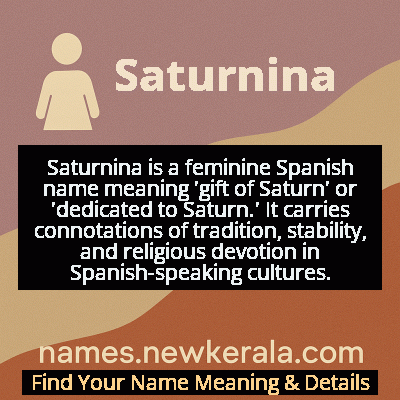Saturnina Name Meaning & Details
Origin, Popularity, Numerology Analysis & Name Meaning of Saturnina
Discover the origin, meaning, and cultural significance of the name SATURNINA. Delve into its historical roots and explore the lasting impact it has had on communities and traditions.
Name
Saturnina
Gender
Female
Origin
Spanish
Lucky Number
9
Meaning of the Name - Saturnina
Saturnina is a feminine Spanish name meaning 'gift of Saturn' or 'dedicated to Saturn.' It carries connotations of tradition, stability, and religious devotion in Spanish-speaking cultures.
Saturnina - Complete Numerology Analysis
Your Numerology Number
Based on Pythagorean Numerology System
Ruling Planet
Mars
Positive Nature
Generous, passionate, energetic, and humanitarian.
Negative Traits
Impulsive, impatient, moody, and can be overly emotional.
Lucky Colours
Red, maroon, scarlet.
Lucky Days
Tuesday.
Lucky Stones
Red coral, garnet.
Harmony Numbers
1, 2, 3, 6.
Best Suited Professions
Military, sports, philanthropy, leadership roles.
What People Like About You
Courage, energy, leadership, generosity.
Famous People Named Saturnina
Saturnina Rodríguez de Zavalía
Religious sister and founder
Founder of the Dominican Sisters of the Annunciation in Argentina
Saturnina García
Educator and feminist
Pioneer in women's education in Spain and advocate for women's rights
Saturnina J. de Ocampo
Philanthropist
Known for charitable works and establishing educational institutions in the Philippines
Name Variations & International Equivalents
Click on blue names to explore their detailed meanings. Gray names with will be available soon.
Cultural & Historical Significance
The name's cultural significance extends beyond religious contexts to represent traditional Spanish femininity and family values. In many communities, Saturnina was seen as a name that embodied strength, resilience, and devotion—qualities highly valued in matriarchal figures. The name often appears in historical records and family genealogies, serving as a marker of cultural continuity and religious heritage. In literature and folk traditions, characters named Saturnina frequently appear as wise grandmothers, steadfast wives, or community pillars, reinforcing the name's association with stability and moral authority. This cultural resonance has ensured the name's survival even as naming trends have shifted toward more modern options.
Extended Personality Analysis
Women bearing the name Saturnina are typically associated with a personality marked by strength, reliability, and deep-rooted values. They often exhibit a calm, measured approach to life, reflecting the stability and patience symbolized by their namesake. Saturninas are frequently perceived as natural caretakers and advisors, possessing an innate wisdom that draws others to seek their counsel. Their thoughtful nature combines practical intelligence with emotional depth, making them excellent problem-solvers who consider multiple perspectives before reaching conclusions. This careful deliberation stems from their respect for tradition and experience, which they view as valuable guides for navigating contemporary challenges.
In social settings, Saturninas may initially appear reserved, but this often masks a warm, loyal nature that reveals itself gradually. They form deep, meaningful relationships built on trust and mutual respect, valuing quality over quantity in their social circles. Their sense of responsibility extends beyond personal relationships to community involvement, where they often take on roles that preserve cultural traditions or support collective well-being. While adaptable to change, Saturninas maintain a core stability that provides anchor points for those around them. They embody the paradox of being both traditional and progressive—honoring the past while thoughtfully engaging with the present, making them bridges between generations and custodians of family and cultural legacy.
Modern Usage & Popularity
In contemporary naming practices, Saturnina has become quite uncommon, primarily surviving as a traditional choice within specific Spanish-speaking communities or as an honor name for family ancestors. The name reached its peak popularity during the late 19th and early 20th centuries but experienced a significant decline mid-century as naming trends shifted toward more modern, international options. Today, it's classified as a vintage or antique name that occasionally sees selective revival among parents seeking distinctive names with historical depth and cultural significance. In Spain and Latin America, the name maintains slightly higher usage in rural areas and among families with strong Catholic traditions or historical consciousness. Recent years have shown a minor resurgence as part of the broader vintage name trend, though it remains outside mainstream popularity charts and is considered a distinctive, almost scholarly choice that reflects appreciation for linguistic heritage and historical continuity.
Symbolic & Spiritual Meanings
Symbolically, Saturnina embodies concepts of time, harvest, and foundational strength, drawing from its etymological connection to Saturn, the Roman deity associated with agriculture, time cycles, and societal structure. The name represents the wisdom that comes from experience and the patience required for meaningful growth. It symbolizes the guardian of traditions and the bridge between ancestral wisdom and contemporary life, suggesting a person who understands the importance of roots while navigating modern complexities. Metaphorically, Saturnina signifies the earth's stability, the rhythm of seasons, and the accumulation of knowledge across generations. The name carries connotations of responsibility, maturity, and the quiet authority that comes from living in harmony with natural and social cycles. It suggests a personality that values substance over surface, depth over immediacy, and legacy over transience—making it a name rich with metaphorical weight about the enduring qualities that sustain individuals and communities through changing times.

